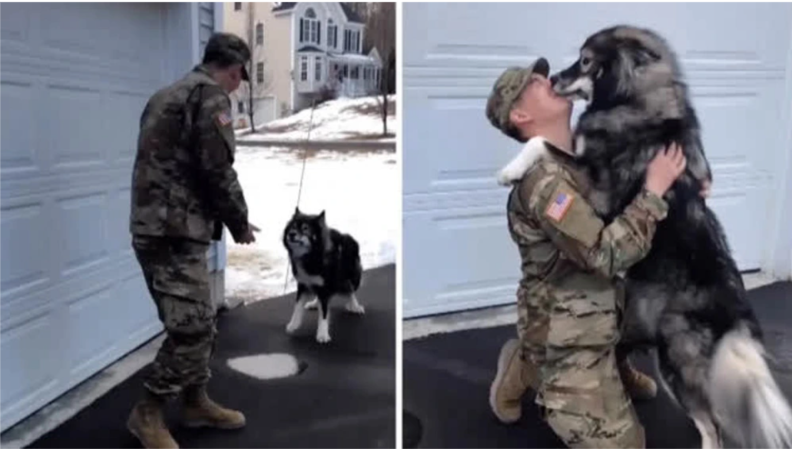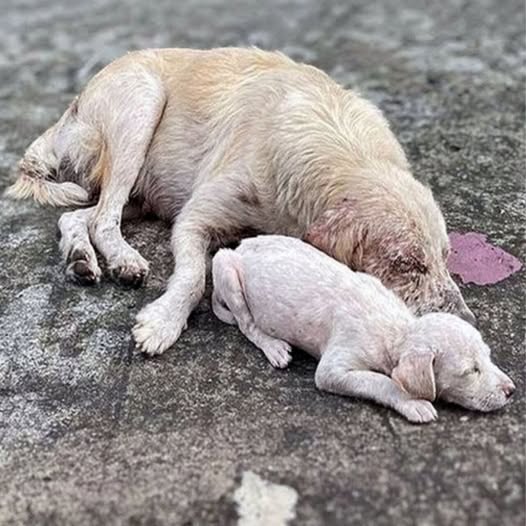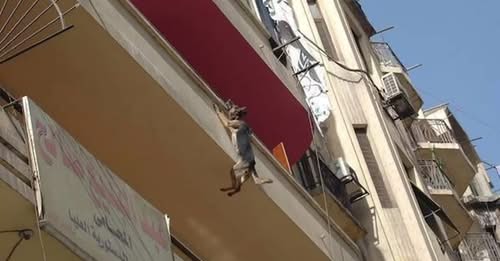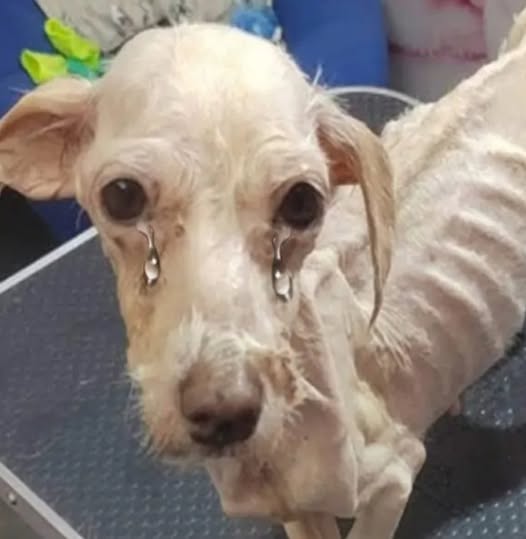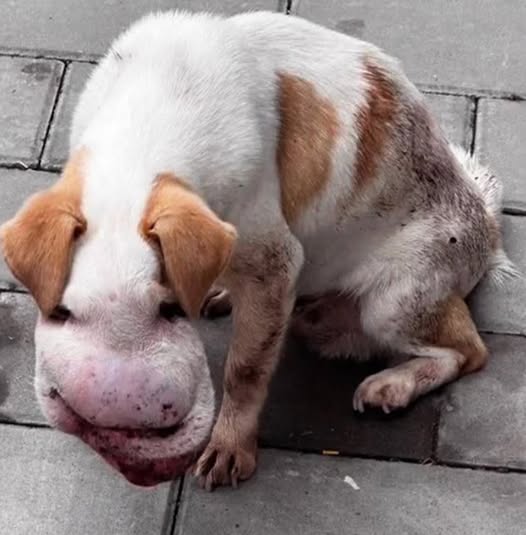Michael Harris never saw himself as a hero. Life had beaten him down in ways most people could never imagine. Years of hardship had left him without a home, relying on scraps and the kindness of strangers just to get through the day. Yet on September 6, 2022, in Jackson, Mississippi, when the Pearl River overflowed after record-breaking rainfall, Michael showed the kind of courage and selflessness that most of us only read about in stories.
He woke up that morning in the abandoned parking garage he had been calling home, groggy and disoriented. At first, the sound of rushing water and distant sirens didn’t fully register. But then came the barking. Short, desperate cries echoing through the watery streets. To Michael, those barks were not background noise—they were a call for help.
Without hesitation, he climbed down from the third floor and stepped into the waist-high water. It was cold, muddy, and littered with floating debris. The streets were nearly unrecognizable, but the cries of the animals guided him. He spotted the first dog, trembling on a porch, water lapping at its paws. Michael coaxed it down, scooping the frightened animal into a shopping cart he had found drifting nearby. That cart became his lifeline, a makeshift rescue boat.
Trip after trip, he ventured back out into the floodwaters, sometimes guided only by sound. A whimper. A howl. A faint scratching from behind a fence. Each noise pulled him deeper into flooded neighborhoods where residents had already evacuated, leaving behind pets they had no way to carry. Some were chained, some trapped behind gates, some too frightened to move. Michael untied them, lifted them, whispered to them that they were safe now.
By the end of the first day, he had gathered nearly a dozen dogs inside the parking garage. He organized them as best he could, tying leashes to railings, drying them with old shirts he carried, and sharing scraps of food he had tucked away for himself. The dogs huddled close to him that night, shivering but alive.
The next morning, Michael set out again. His legs ached from wading against the current, and his body longed for rest, but the cries didn’t stop. Each time he thought he had brought in the last one, another bark echoed through the flooded streets. He found puppies clinging to floating boards, a Labrador trapped on top of a car hood, and an old hound struggling to keep its head above the water. He tied leashes to his belt, dragging three or four behind him as he guided them back to the garage.
Neighbors who had evacuated later said they had seen him from a distance, trudging through the water with dogs following in a line, as if they knew this man—homeless and forgotten—was their only chance at survival.
By the third day, Michael had gathered thirty dogs. Some were playful despite the chaos, nudging him with wet noses as if thanking him. Others were still in shock, too exhausted to move. Michael hardly slept, his body propped against a wall while the dogs curled around him. He rationed what little food he could scavenge, making sure they ate before he did.
When rescue teams finally reached the garage, they were stunned by what they found. Thirty dogs, alive, gathered around a weary man who had risked everything to save them. Michael was pale, shivering, and clearly exhausted, but he smiled faintly when asked why he hadn’t left with the others. His answer was simple: “They would’ve stayed for me.”
News of Michael’s actions spread quickly, first through local reports and then across the country. Social media lit up with praise. Strangers who had never met him called him a hero. Animal lovers shared his story, marveling at the bond between a man who had so little and the dogs who had nothing at all.
Some questioned how he had managed it, how someone with no resources could save so many lives when the city’s official systems were overwhelmed. But those who know animals understood. Sometimes, compassion is more powerful than money, more resourceful than any organized plan. Michael had nothing to his name, but he had heart. And in the end, that was enough.
The dogs were eventually taken to shelters, checked by veterinarians, and placed with foster families. Many of them were reunited with their owners who had evacuated in a rush, forced to leave pets behind. For the families who thought they had lost everything, discovering their dogs alive was like receiving a miracle. Others found permanent homes, adopted by people who had heard Michael’s story and wanted to honor his courage.
As for Michael, his life didn’t suddenly become easy. Heroism doesn’t erase years of hardship, and when the cameras left, he remained a man without a permanent home. But something had shifted. Communities rallied around him, offering support. Animal rescue organizations reached out, some even helping him with temporary shelter and opportunities to work with animals. For the first time in years, Michael felt seen—not as a man who had lost everything, but as a man who had given everything.
In the weeks that followed, Michael was often asked if he regretted risking his life in those floodwaters. He always gave the same answer. “No one else was coming. They were scared, just like me. But I couldn’t leave them. I’ve been left behind before. I know how that feels. I wasn’t going to let it happen to them.”
That sentiment struck a chord with people everywhere. His words reminded us that empathy often comes from understanding pain. Michael knew what abandonment felt like, and so he refused to abandon those who depended on him.
In a world where stories of tragedy often overshadow stories of kindness, Michael’s actions stand as a reminder of the quiet heroes who walk among us. He didn’t act for recognition or reward. He acted because, in that moment, thirty lives were in danger, and he was the only one who could help.
Months later, some of the families who had been reunited with their pets reached out to Michael again. They invited him to barbecues, thanked him with home-cooked meals, and some even offered him a place to stay. While he remained humble and hesitant to accept too much, he never turned down the chance to see one of “his dogs” again. Each wagging tail, each joyful bark, reminded him why he had done it.
The Pearl River eventually receded, the city of Jackson rebuilt, and life returned to something close to normal. But for those thirty dogs—and for Michael Harris—the flood changed everything. It revealed a truth often hidden in plain sight: heroism doesn’t always come dressed in uniforms or badges. Sometimes, it comes from the heart of someone who has already lost so much, yet still chooses to give everything they have left.
Michael’s story continues to be told today, not just as a tale of survival, but as a testament to the bond between humans and animals. It is proof that compassion can rise from the most unexpected places. And perhaps most importantly, it challenges us to look beyond appearances, to see the worth in every person, no matter their circumstances.
The homeless man who once felt invisible became a symbol of courage, loyalty, and love. His legacy lives on in the lives of thirty dogs who were given a second chance, and in the hearts of all who heard his story.
And maybe, just maybe, the next time the world is quick to dismiss someone for what they lack, we will remember Michael Harris—the man with nothing, who gave everything.

